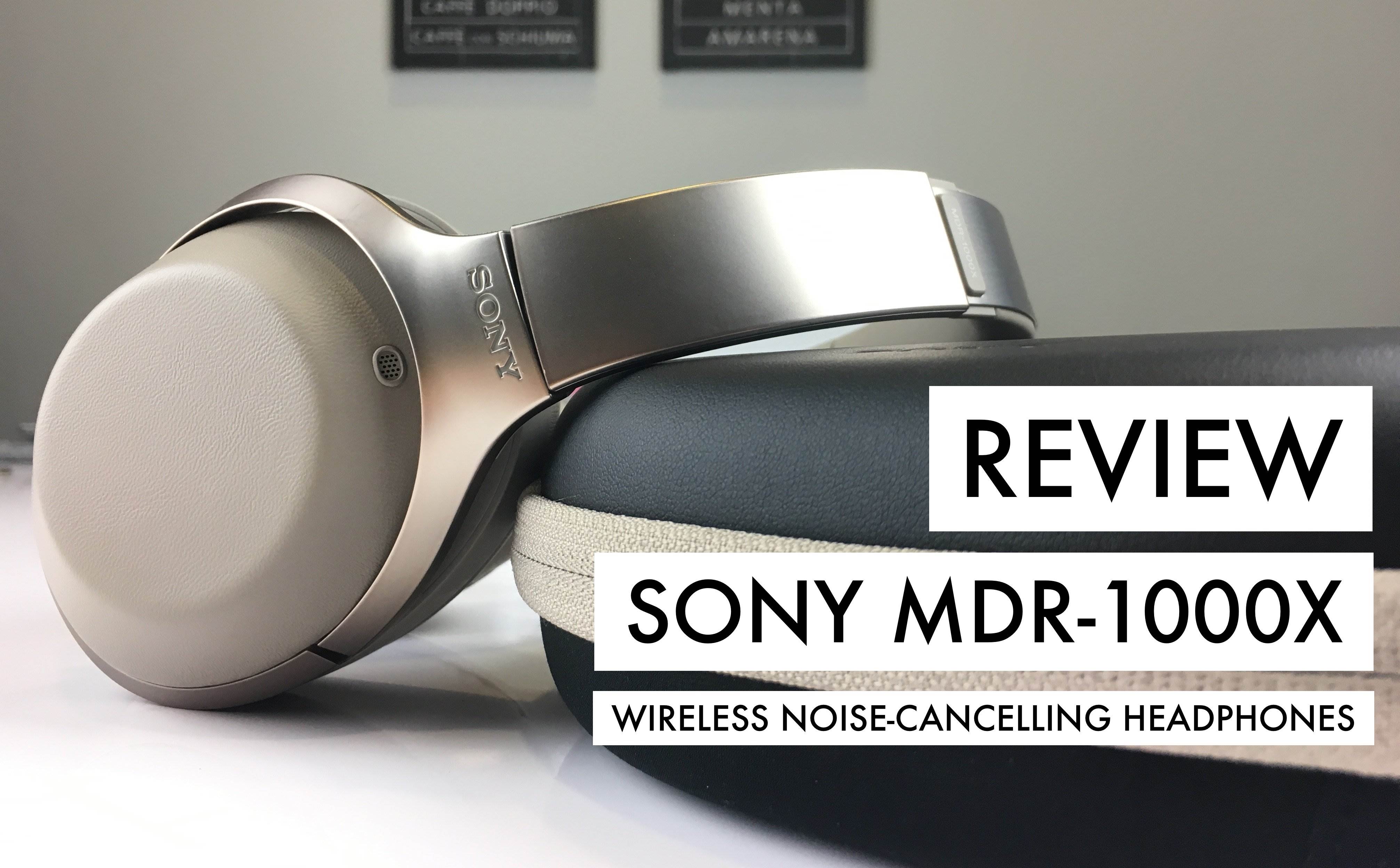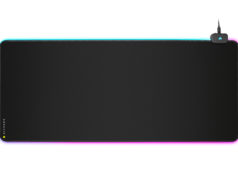In the face of Bose’ dominance in consumer noise-cancelling, Sony staked their claim to the crown by unleashing the new MDR-1000X Noise-Cancelling Headphones. it is reputed to be their best noise-canceller, right up there with big names like Bose and Sennheiser. So, what does this reviewer think of Sony’s best noise-canceller? Read on to find out!
Build Quality and Design
The 1000X is a wireless over-the ear headphones built specifically for travel. So it comes in a hard carrying case to protect it from incidental bumps, and has a thick and solid headband wrapped in polycarbonates and aluminium, with no exposed wiring. It is lightweight, almost as lightweight as the popular Bose QC35. And, with its gentle clamping force, it’s comfortable to wear for long periods. The synthetic leather cushions are slightly thicker than the Bose’, but still pretty comfy around my ears. The earcups are overlaid with synthetic leather, which adds a premium feel to it.

Image Taken by: Aaron T.
Sony has clearly gone for clean here. There are only three visible buttons on the underside of the left ear cup which handles power, noise cancelling and ‘Ambient Sound Mode’ (more on that later). You can operate other controls like volume and music controls by tapping or swiping your finger across the touch-sensitive right ear cup. Overall, the build quality is fantastic!

Image Taken by: Aaron T.
Performance and Features
Battery Life
On paper, the MDR-1000X packs around 20 hours of juice playing wirelessly with noise-cancelling – pretty much on par with the Bose QC35. But in testing, I got out more than 21 hours playing a looping album at 50% volume, more than its stated reading! It takes only a few hours to charge up through its Micro-USB port.

Battery Test In Progress. Image Taken by: Aaron T.
Noise Cancelling
With internal and external noise-sensors, this is billed as Sony’s best noise-canceller, so I decided to put it through a series of tests. Every environment has its unique sound signature and I wanted to know how Sony’s SENSE Engine would react in different situations, so i took it outside for a few days. Riding the MRT, much of the noise in the train is cancelled out, even without music! I could still hear faint voices in a crowded train, but putting on music makes that even more inaudible. On the streets, I could make out sounds of vehicles and other background noises, but it was vastly more quiet than not using the 1000X at all.

Touch Controls. Image Taken by: Aaron T.
The 1000X packs some smart features. It’s got sensors that can optimise its sound according to your wearing style. And, if you need to quickly lower your music volume and let some important sounds through, (train station announcement, ordering a takeaway from the hawker) simply place your hand on the right ear cup to activate ‘Quick Attention’ mode. The microphone amplifies what’s going on around you very well, even picking up private conversations among strangers! Interesting.
‘Ambient Sound’ mode enables the microphones to relay more environmental sounds while you still enjoy your music. Both aforementioned features work as advertised.
It’s done a pretty good job so far; and from my testing, I’m quite sure that it cancels more mid-range decibels than even the Bose QC35. This makes it better for blocking out that annoying office-chatter. But, the 1000X does not seem to reduce as much of the lower bass frequencies as the QC35, so I can’t be sure how it will compare on plane trips with abundant low-frequency rumble. I put on some simulated low frequency clips and the difference seems very small, but it’s there nonetheless. Unfortunately, I’ve also picked up slightly more background hiss on the 1000X than the QC35.

Bose QC35 Headphones, Silver. Image Courtesy: Head-fi.Org
My biggest gripe about the 1000X is, you can’t simply use it as a noise-canceller out of the case. You have to connect it to something by Bluetooth (or cable) first! I discovered this during my first noise-cancelling test, when it kept switching off every five minutes. It’s funny how the 1000X is marketed heavily as a leading noise-canceller, when you can’t use it as just that – unless you tether it!

Cushions Close Up. Image Taken by: Aaron T.
Sound Quality
The 1000X transmits Bluetooth audio over Sony’s proprietary LDAC technology, which has superior transfer rates compared to standard Bluetooth SBC. It also uses DSEE HX audio processing to touch-up and upscale lower resolution files. They do seem to work as advertised and the result I got was a forgiving, relaxed sound signature; that still delivers good track separation, pace and detail level, even for lower-res files. At louder volumes, the 1000X maintains its clarity effortlessly and without any perceivable grain. You will also get great bass attack and extension that is well confined, without introducing any noticeable artefacts in the mid-range.

Image Taken by: Aaron T.
It will sound great for most types of music like Pop, R&B, Classical and Jazz. Its mid-range lacks bite but I see that as more of an advantage, smoothing the edges off my rock ballads – like in ‘Heaven’ by Bryan Adams. His vocals now sounded less harsh than I remembered. There was sufficient air that did not feel over-done, while percussions and bass guitar are well separated and imaged.
When playing ‘Wild Things’ by Alesia Cara, I enjoyed her laid back and clear vocals set upon a detailed soundstage. Bass had good attack and extension against a fairly black background, but high frequency notes sounded rolled off.
For folks in the Hi-Res camp who are used to more forward, engaging vocals, the 1000X’s rounder mid-range will not please. But its detail level, sound staging and bass extension is ample reason to give this a serious auditioning. Overall, its sonic qualities can match the performance of the vaunted Bose QC35.
Bluetooth Connection is reliable overall within a 10m distance line of sight, and I did not experience any video/audio sync issues when enjoying YouTube.

Image Taken by: Aaron T.
Price
At S$599, the Sony MDR-1000X is priced against the Bose QC35. It’s got great build-quality and battery life, and is just about as lightweight and comfy. It cancels a bit more audible (mid-range) noise than its rival but that advantage is partially eroded by its gentler low-frequency noise reduction, and slightly more background hiss. Its 5-minute shutdown timer (while not connected to anything) is not a deal-breaker but remains a small annoyance. As such, I will rate the 1000X as moderate value for money compared to its rival.
Conclusion
With best-in class noise-cancelling (comparable to the QC35), competitive price and great sound quality, the S$599 Sony MDR-1000X lives up to its reputation with great performance throughout my tests. I will highly recommend it but with a small caveat – you must tether it to your device to use its noise-cancelling! Available in Black or Beige (featured).
So here’s the final tally:
Build Quality and Design (Noise Cancelling Headphone)
- Pros: Sturdy polycarbonate and aluminium design with no exposed wiring. Lightweight with gentle clamping force. Synthetic leather cushions are plush and feels comfortable. Clean aesthetics with only three visible buttons and touch-sensitive controls. Comes with a protective clamshell pouch.
- Cons: None that I can come up with.
Score: 5/5 (33.3%)
Performance and Features
- Pros: Great battery life, effortlessly meets the stated reading. Great noise-cancelling with more emphasis on mid-range frequencies. Smart noise-cancelling features that make sense and are intuitive to use. Automatically optimises sound quality to fit the person. Full, detailed sound quality that rivals the Bose QC35. Reliable Bluetooth connection with no audio/video sync issues.
- Cons: Laid-back and rounded mid-range coloration may not suit everyone’s listening preferences. Headphones cannot operate as a standalone noise-canceller, but must be tethered to a device.
Score: 6/8 (25%)
Price
The Sony MDR-1000X has great build-quality and battery life, is lightweight and comfortable to wear. Its noise-cancelling is comparable to the Bose QC35 in many ways. Its 5-minute shutdown timer (while not connected to anything) is not a deal-breaker but remains a small annoyance. At S$599, I will rate the 1000X as moderate value for money compared to its rival.
Score: 3/5 (19.98%)






